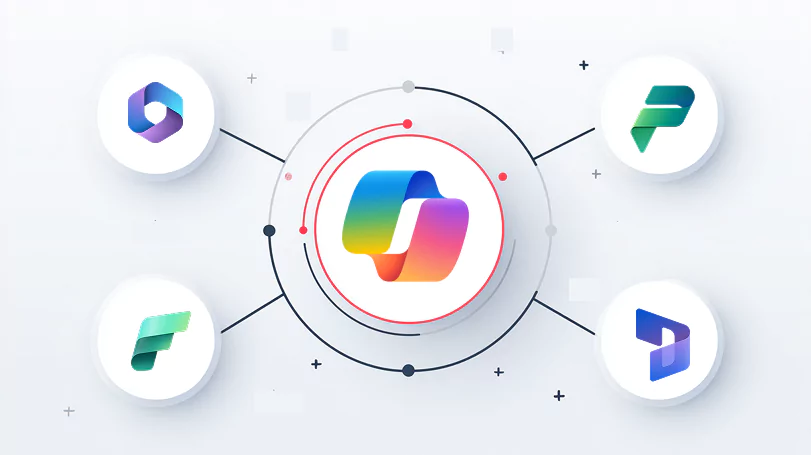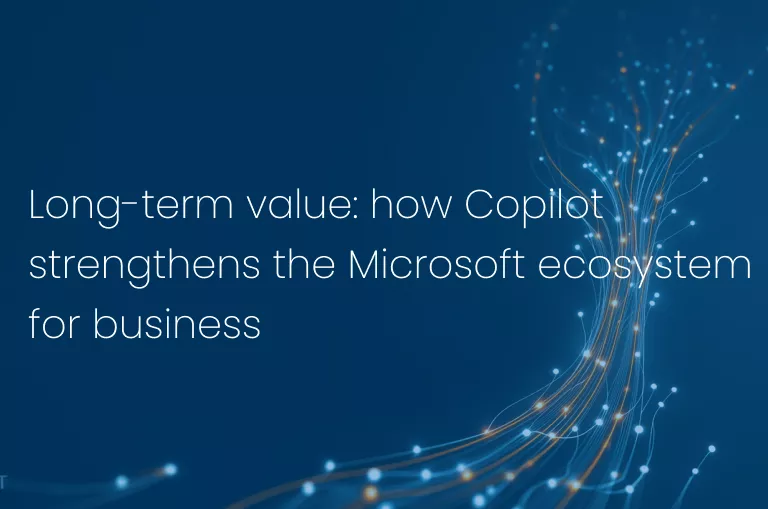Long-term value: how Copilot strengthens the Microsoft ecosystem for business
Introduction – why the Microsoft ecosystem just got stronger
Artificial intelligence has reached a point where it is no longer an optional experiment. It is shaping how work gets done every day. Microsoft Copilot is at the centre of this shift, but its significance goes beyond clever prompts or fast document creation. For companies using Microsoft 365, Dynamics 365, or the Power Platform, Copilot has the potential to enhance the entire digital environment and create a lasting business impact.

Many organisations initially view Copilot as a way to save time on repetitive tasks. While that is true, the real advantage comes when AI is embedded deeply into the systems employees already trust. At ARP Ideas, we have seen this first-hand in projects where Copilot has helped clients accelerate digital transformation while improving governance and security.
Understanding Copilot’s role inside the Microsoft ecosystem
Copilot is Microsoft’s family of AI-powered assistants built into its core business platforms. Instead of requiring separate tools, it operates where people already work - in Teams, Word, Excel, Dynamics 365 apps, Power Platform and even GitHub. Azure OpenAI models power each Copilot and use the Microsoft Graph to understand context such as emails, documents, calendar events and CRM records.
Types of Copilot and where they help
-
Microsoft 365 Copilot: Generates meeting summaries, rewrites documents, creates presentations and surfaces key points from long email threads.
-
Dynamics 365 Copilot: Supports sales, marketing and service teams with personalised content, lead prioritisation and faster case resolution.
-
Power Platform Copilot: Simplifies building apps, workflows and chatbots using natural language instructions.
-
GitHub Copilot assists developers by suggesting code and explaining functions directly within their IDE.
Because these Copilots share the same security and compliance foundations as the Microsoft cloud, data remains within your tenant boundaries. Features like sensitivity labels and role-based access control continue to apply, which is crucial for regulated industries.
A short Microsoft overview shows how each Copilot fits within the ecosystem.
Why Copilot creates sustainable business impact
Short-term productivity gains are appealing, but decision-makers want to know whether AI deployment will sustain its effectiveness over time. Copilot supports lasting outcomes because it scales with business needs and integrates with trusted systems.
Making work faster and more focused
Early users reported 14 minutes saved per day on average, and 29% faster performance across tasks (searching, writing, summarising). These small wins compound across teams, creating measurable ROI.
Empowering people rather than replacing them
A common concern is that AI might threaten jobs. In practice, we see the opposite. Copilot helps employees spend less time on administrative tasks and more time on critical thinking, strategy, and customer interactions. For example, sales teams can automatically prepare tailored proposals using Dynamics 365 data while still bringing their expertise to the final negotiations.
Connecting data for better decisions
When AI can surface insights across emails, documents and CRM records, leaders get a clearer view of trends and risks. Finance directors we have worked with use Copilot to analyse pipeline data alongside reports in Power BI, accelerating forecasting and resource planning.

Practical business scenarios: from quick wins to transformation
Copilot’s flexibility enables it to deliver measurable benefits across various departments. Here are real-world use cases we have seen at ARP Ideas:
| Business area | Scenario | Impact |
|---|---|---|
| Operations | Automate weekly KPI reports with Power Automate and summarise them in Teams | Hours saved on manual compilation |
| Customer service | Draft personalised responses and knowledge articles in Dynamics 365 | Faster case resolution and improved satisfaction |
| Sales | Build proposals using CRM data and generate competitor overviews | Shorter sales cycles and better preparation |
| Leadership | Create board-ready summaries from files, emails and reports | Clearer strategic insights without extra admin |
Organisations often start with one or two scenarios and scale once employees become comfortable with AI-driven workflows. This phased approach reduces risk and helps build internal champions.
Challenges and misconceptions to address early
While the benefits are clear, successful rollout requires thoughtful preparation.
Cultural readiness
Many employees worry that AI might replace their jobs. In reality, Copilot supports staff by automating low-value tasks, allowing them to focus on more complex work. Clear communication and training help reduce anxiety.
Technical readiness
Copilot is most effective when data and security policies are well-structured and organised. Review access rights, sensitivity labels and data lifecycle rules before rollout.
Change management
Users may initially hesitate to trust AI outputs. Creating feedback loops and usage guidelines builds confidence and encourages experimentation.
At ARP Ideas, we guide clients through security reviews, governance planning and user enablement strategies. This ensures that Copilot is both safe and effective from the start.
How to prepare your organisation for long-term success with Copilot
A structured readiness plan helps turn AI interest into measurable outcomes. We recommend the following steps:
-
Assess your data
Audit where sensitive information lives and ensure permissions are up to date. Tools like Microsoft Purview can help. -
Align with business priorities
Define where AI can deliver the most benefit: sales productivity, reporting, customer service, or innovation. -
Enable your teams
Provide training sessions and designate internal champions to support colleagues. Encourage experimentation with clear usage guidelines. -
Review licensing and integration
Check Microsoft 365 or Dynamics 365 plans to confirm Copilot eligibility. Consider extending to the Power Platform for custom scenarios.
Organisations that invest time in these steps typically see faster uptake and more substantial long-term ROI.
The bigger picture – future of AI inside Microsoft’s ecosystem
Expanding integration across data and apps
Copilot is evolving rapidly. With Microsoft Fabric’s unified data foundation and deeper Azure OpenAI integrations, companies will soon be able to connect more data sources and create industry-specific copilots.
Strategic reason to invest early
Early deployment helps teams build AI confidence, develop internal capability and prepare for faster innovation as new features roll out.
Partnering with experts like ARP Ideas can make this journey smoother. Our experience with Microsoft technologies — ranging from Dynamics 365 deployments to Power Platform app development provides clients with a clear roadmap for responsible and impactful AI use.
Key takeaways
-
Copilot strengthens the Microsoft ecosystem by uniting productivity, data and security.
-
Long-term ROI comes from structured preparation, clear use cases and effective enablement.
-
Starting small and scaling builds trust and capability across the organisation.
-
Early AI maturity creates a competitive advantage as Microsoft expands its platform.
-
Partnering with experienced advisors accelerates safe and valuable Copilot deployment.
FAQ
Is Copilot secure for enterprise data?
Yes. It uses the same compliance, identity and security frameworks as Microsoft 365 and Azure. Data stays within your tenant and follows existing access controls.
Do we need the entire Microsoft stack to use Copilot?
No. Copilot can run in Microsoft 365 apps alone, but deeper integration with Dynamics 365, Power Platform and Microsoft Fabric unlocks greater benefits.
How quickly can we expect a return on investment?
Teams often report noticeable time savings within weeks of deployment, especially in meeting recap and content creation.
Will Copilot work with our existing data governance rules?
Yes. However, it is vital to review permissions, sensitivity labels and lifecycle policies before rollout to ensure data is used safely.
What licences are required for Microsoft Copilot?
Eligibility depends on your plan. Microsoft 365 Copilot typically requires E3 or E5 licences, while Dynamics 365 Copilot is available in CRM and ERP apps with active subscriptions.
Ready to explore how Copilot can transform your Microsoft environment? Contact ARP Ideas for a tailored readiness assessment and implementation plan.


